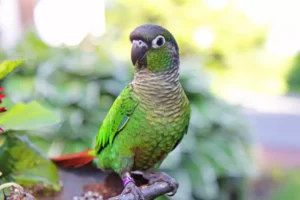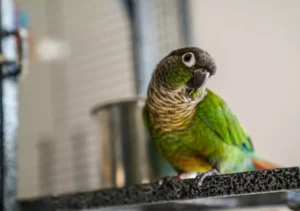If you have a green cheek conure, you’ve probably noticed that your feathered friend bobs his head up and down sometimes. But why does he do this? There are actually a few reasons why green cheek conures bob their heads.
One reason is that they’re trying to get your attention. If you notice your green cheek conure bobbing his head when you’re not paying attention to him, it’s likely that he wants you to focus on him.
Another reason green cheek conures bob their heads is that they’re excited or happy.
If your green cheek conure is bobbing his head up and down rapidly, it’s a good sign that he’s feeling good about something.
Perhaps he’s just had a tasty treat, or he’s looking forward to playing with you. Either way, it’s a positive sign! Your green cheek conure may be bobbing his head for a few reasons.
For one, it could be a way of showing excitement or anticipation. Head bobbing can also be a sign of affection, as your bird is trying to get closer to you.
Additionally, head bobbing can indicate that your green cheek conure is bored and wants some attention.
If you notice your bird’s head bobbing frequently, try giving him some toys to play with or spending more time interactively playing with him.

What Does It Mean When My Conure Bobs Her Head?
There are a few different things that conures do when they bob their heads, and it can be difficult to determine exactly what it means.
Sometimes, head-bobbing is a sign of excitement or happiness, while other times it may be a sign of fear or insecurity.
If your conure bobs her head frequently, it’s important to pay attention to her body language and vocalizations to try to understand what she’s trying to communicate.
One common reason for head-bobbing is simply because the bird is enjoying herself and wants to show you how happy she is. This might happen when you’re playing with her, or when she’s eating her favorite food.
If your conure bobs her head and also makes happy noises, then this is probably what she’s trying to tell you.
Another possibility is that your conure is feeling insecure or scared about something. This might happen if there’s been a change in her environment, such as a new person moving into the house.
If your bird seems agitated or won’t stop bobbing her head, it’s best to take her out of the situation and see if she calms down.
If you’re not sure why your conure is bobbing her head, it’s always best to consult with an avian vet who can help you figure out what’s going on.
Why is My Bird Always Bobbing His Head?
There are a few reasons your bird may be bobbing his head. The first is that it’s part of their natural behavior. Birds bob their heads to keep balance while perching and also when they’re looking around for food.
It’s also a way of showing excitement or interest, similar to how we might nod our heads when we’re paying attention to someone.
Another reason your bird may be bobbing his head is that he’s trying to get your attention.
Head-bobbing can be a sign of affection or begging for food, so if you notice your bird does it more when he’s around you, it could mean he wants some quality time or a treat!
If you’re ever concerned about your bird’s health, it’s always best to consult with an avian veterinarian. They will be able to give you peace of mind and help you figure out the root cause of any unusual behaviors.

Why Do Green Cheek Conures Bonk?
Green cheek conures are known to be very active and playful birds. They are also known to be quite nippy, which can sometimes result in them “bonking” their owners on the head with their beaks.
While this may seem like aggressive behavior, it is actually just the green cheek’s way of playing and showing affection.
So, if your green cheek conure starts bonking you on the head, don’t worry, they’re just trying to have some fun!
How Do You Know If Your Conure is Happy?
Your conure’s happiness is important to you, and you want to make sure that your feathered friend is content. But how can you tell if your conure is truly happy?
There are a few key things to look for when trying to gauge your conure’s happiness.
First, take a look at his or her body language. A happy conure will often have an upright posture and may even bob his or her head up and down in excitement.
Additionally, happy conures typically have their tails held up high and spread out – this is known as the “flag tail” position and is a good indicator of a content bird.
Another way to tell if your conure is happy is by observing his or her behavior. Happy birds are often playful and active, vocalizing frequently with cheerful sounds.
If your conure seems lethargic or inactive, it may be a sign that something isn’t quite right. Additionally, watch for any self-destructive behaviors such as feather plucking, this can be a sign of stress or unhappiness in birds.
Green Cheek Conure Body Language
“Your Green Cheek Conure is trying to tell you something! Body language is an important part of communication for all birds, and your Green Cheek Conure is no exception.
By paying attention to your bird’s body language, you can better understand its moods and emotions.
Here are some common body language cues to look for in your Green Cheek Conure:
- Preening: Preening is a calming, self-soothing behavior that birds often do when they’re feeling content. If you see your bird preening itself, it’s a good sign that it’s happy and relaxed.
- Puffed-up feathers: When a bird puffs up its feathers, it’s usually trying to make itself look bigger and more intimidating. This behavior is often seen during disputes with other birds or when the bird feels threatened. If you see your Green Cheek Conure puffing up its feathers, try to figure out what might be causing the stress and remove the source if possible.
- Flapping wings: Birds flap their wings for many reasons, including exercise, cooling off, drying off, and showing excitement or aggression. If you see your Green Cheek Conure flapping its wings frequently, pay attention to its other body language cues to determine why it might be doing this. For example, wing flapping combined with head bobbing could be a sign of excitement, while wing flapping combined with an open beak could be a sign of aggression.
Understanding your Green Cheek Conure’s body language will take time and patience, but it’s worth it! By learning to read your bird’s moods, you can create a stronger bond and provide the best possible care.
Conclusion
Conures are intelligent, social birds that make great pets. However, they can also be quite mischievous! One common behavior that green cheek conures engage in is head bobbing.
Head bobbing is a way for your green cheek conure to communicate with you. It can mean many things, including “hello,” “I’m happy,” or “I want attention.”
If you see your green cheek conure head bobbing, it’s best to respond in some way so he knows you’re listening. One reason your green cheek conure may start head bobbing is if he’s bored.
If this is the case, try offering him new toys or opportunities to play and explore. He may also head bob if he’s scared or feels threatened.
In this case, it’s important to create a safe and secure environment for him so he feels comfortable.